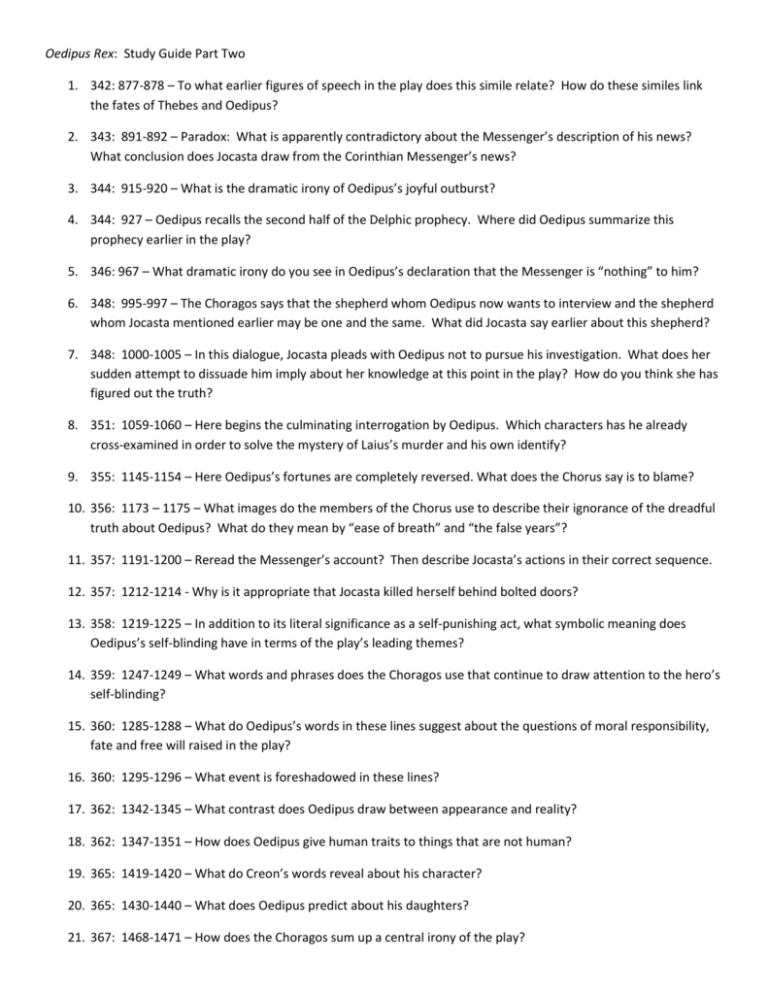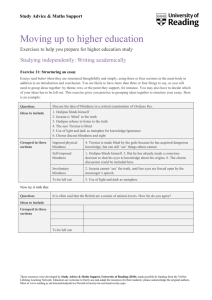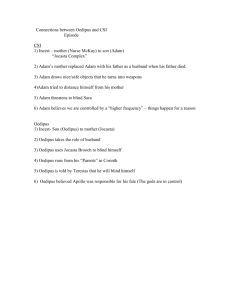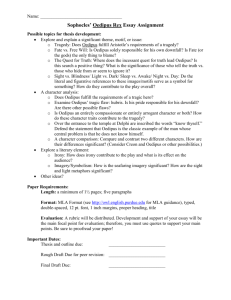Oedipus Rex: Study Guide Part Two 1. 342: 877
advertisement

Oedipus Rex: Study Guide Part Two 1. 342: 877-878 – To what earlier figures of speech in the play does this simile relate? How do these similes link the fates of Thebes and Oedipus? 2. 343: 891-892 – Paradox: What is apparently contradictory about the Messenger’s description of his news? What conclusion does Jocasta draw from the Corinthian Messenger’s news? 3. 344: 915-920 – What is the dramatic irony of Oedipus’s joyful outburst? 4. 344: 927 – Oedipus recalls the second half of the Delphic prophecy. Where did Oedipus summarize this prophecy earlier in the play? 5. 346: 967 – What dramatic irony do you see in Oedipus’s declaration that the Messenger is “nothing” to him? 6. 348: 995-997 – The Choragos says that the shepherd whom Oedipus now wants to interview and the shepherd whom Jocasta mentioned earlier may be one and the same. What did Jocasta say earlier about this shepherd? 7. 348: 1000-1005 – In this dialogue, Jocasta pleads with Oedipus not to pursue his investigation. What does her sudden attempt to dissuade him imply about her knowledge at this point in the play? How do you think she has figured out the truth? 8. 351: 1059-1060 – Here begins the culminating interrogation by Oedipus. Which characters has he already cross-examined in order to solve the mystery of Laius’s murder and his own identify? 9. 355: 1145-1154 – Here Oedipus’s fortunes are completely reversed. What does the Chorus say is to blame? 10. 356: 1173 – 1175 – What images do the members of the Chorus use to describe their ignorance of the dreadful truth about Oedipus? What do they mean by “ease of breath” and “the false years”? 11. 357: 1191-1200 – Reread the Messenger’s account? Then describe Jocasta’s actions in their correct sequence. 12. 357: 1212-1214 - Why is it appropriate that Jocasta killed herself behind bolted doors? 13. 358: 1219-1225 – In addition to its literal significance as a self-punishing act, what symbolic meaning does Oedipus’s self-blinding have in terms of the play’s leading themes? 14. 359: 1247-1249 – What words and phrases does the Choragos use that continue to draw attention to the hero’s self-blinding? 15. 360: 1285-1288 – What do Oedipus’s words in these lines suggest about the questions of moral responsibility, fate and free will raised in the play? 16. 360: 1295-1296 – What event is foreshadowed in these lines? 17. 362: 1342-1345 – What contrast does Oedipus draw between appearance and reality? 18. 362: 1347-1351 – How does Oedipus give human traits to things that are not human? 19. 365: 1419-1420 – What do Creon’s words reveal about his character? 20. 365: 1430-1440 – What does Oedipus predict about his daughters? 21. 367: 1468-1471 – How does the Choragos sum up a central irony of the play?








